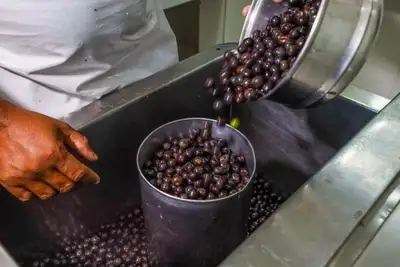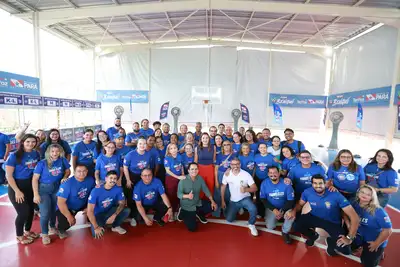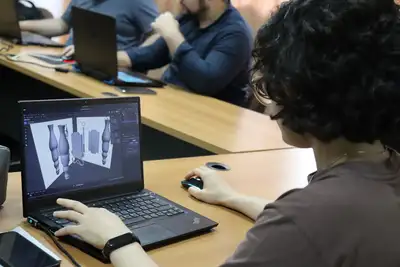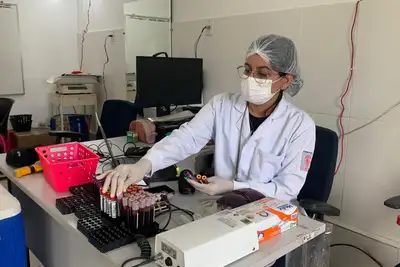In Pediatric Oncology, lectures raise awareness about signs and symptoms of breast cancer
The programming related to Pink October guided employees and caregivers of patients treated at the unit
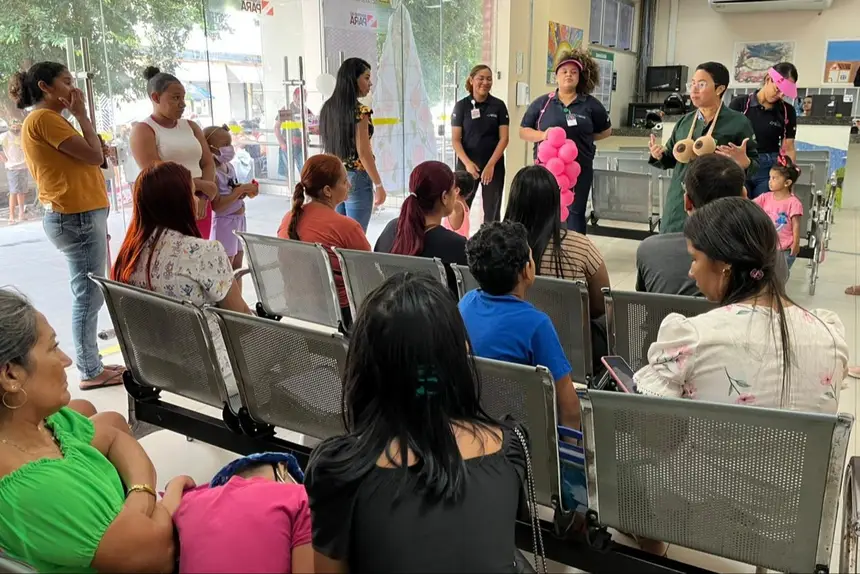
Themed around prevention, diagnosis, and treatment of breast cancer were discussed in lectures held this Wednesday (29) and Thursday (30) at the Octávio Lobo Children's Oncology Hospital (Hoiol) in Belém. The activities took place in the auditorium and reception of the unit, promoting awareness about the neoplasm that predominantly affects adult women, the predominant profile among employees and families of children and adolescents in treatment.
According to the National Cancer Institute (Inca), breast cancer continues to be the type that causes the most deaths among women in Brazil. For this year, the estimate is 73,610 new cases of the disease. In 2025, the Ministry of Health (MS) expanded the age range for active screening in the Unified Health System (SUS) and currently recommends mammography for women aged 40 to 74, even without signs or symptoms of neoplasia in the breast.
The nurse from the Specialized Service in Safety Engineering and Occupational Medicine (Sesmt) of Hoiol, Rosinete Soares, emphasizes that knowledge and self-care are essential to identify signs of the disease early. “In support of the Pink October campaign, Hoiol designed these moments to guide both employees and the companions of users. Knowledge helps in prevention and in seeking an early diagnosis. Furthermore, correct information dispels myths, alleviates fears, and shows us that care should start before the disease,” she said.
The lectures also addressed risk factors such as excess weight, sedentary lifestyle, and alcohol consumption. Wearing a crochet accessory that represented the breasts, the speaker also demonstrated how to perform a self-exam and explained which signs deserve attention. “It is necessary to seek medical guidance upon noticing changes in the skin, lumps, breast asymmetry, discharge, and pain,” warned Rosinete.
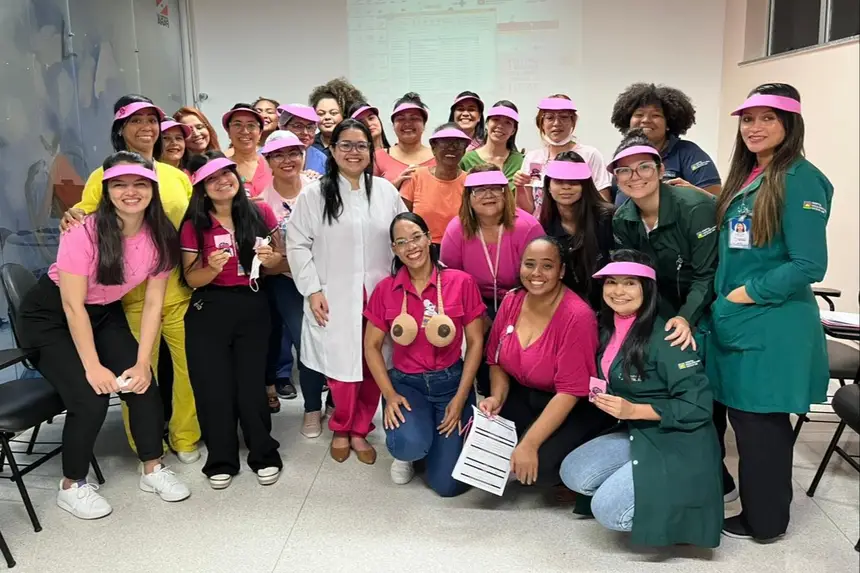
The unit's team also presented an educational dance that illustrated the step-by-step of the breast self-exam and helped reinforce the importance of prevention and early diagnosis. “The playful presentation facilitates the memorization of what women need to observe and palpate to identify changes. The steps and the beat of the music are as simple as the exam,” added the speaker.
Among the participants, employee Joyce Wanzeler, 43, leader of the User Service at Hoiol, shared a personal experience. “Once, I accidentally hit my left breast and noticed changes in size, redness, and pain. I was quite anxious, as was my family, who suffered until I decided to seek medical help. The specialist calmed me down and guided me on the steps I should follow. I had the exams and found out that they were not cancerous tumors, but liquid cysts. There were four in one breast and three in the other, all palpable. And despite knowing about the self-exam, I, like many women, did not have the habit of palpating my breasts or carefully looking for any changes,” she recounted.
For Joyce, campaigns like Pink October encourage care. “The campaign shows us that we need to put into practice what we learn. And these lectures, with playful demonstrations on how to perform the self-exam, are very enlightening. I speak openly about my experience so that other women look closely at themselves. Consult a doctor and have screening exams regularly. Prevention and early diagnosis save lives,” Joyce stated.
Originally from the municipality of Augusto Corrêa, in northeastern Pará, housewife Mara Alves, 38, accompanies her son, Murilo, 2, in treatment for Acute Lymphoblastic Leukemia (ALL). She says that since her child's diagnosis, which occurred four months ago, she has dedicated herself exclusively to caring for her son and felt she had no time to take care of her own health. “With the lecture talking about the importance of prevention and self-care, I recognize that it is essential to pay attention to the symptoms of our body and that it is important to take care of ourselves. Self-care is also a form of prevention. Although I had an ultrasound of my breast before Murilo was born, I will be more attentive, plan, and have preventive exams, as I am approaching 40 (years),” she stated.
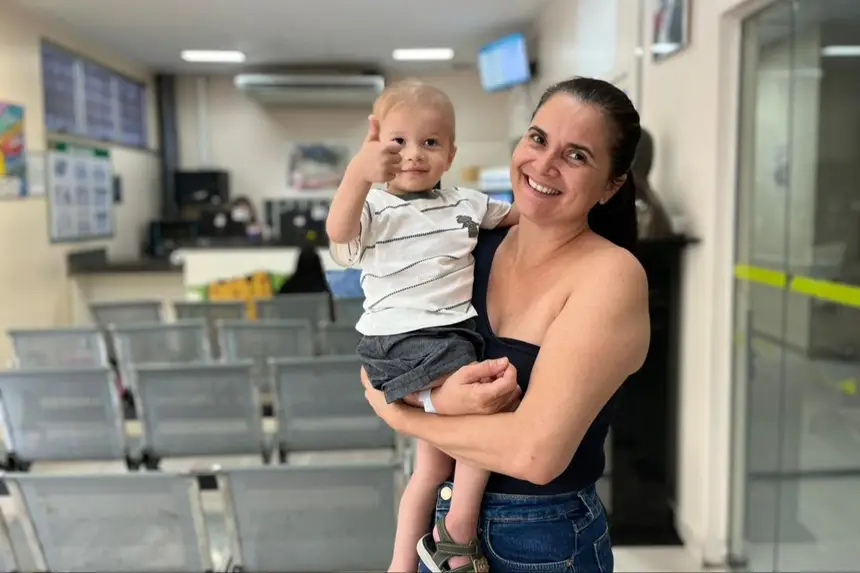
Service - Accredited as a High Complexity Unit in Oncology, the Octávio Lobo Children's Oncology Hospital is a reference in the Northern region for the diagnosis and specialized treatment of childhood and adolescent cancer, in the age group of 0 to 19 years. The unit is managed by the Institute Diretrizes (ID), under a management contract with the State Department of Public Health (Sespa).
Text: Ellyson Ramos - Ascom Hoiol




